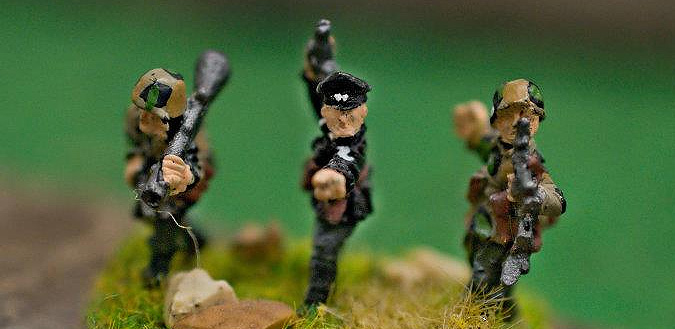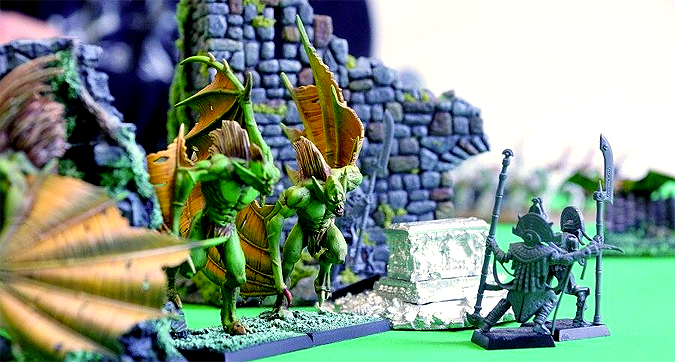Writing this story has been a bit of a trip down memory lane. I was a gaming nerd back in school, and though I’ve let the interest slide, it was fun to reconnect with the hobby here in Prague and to get a sense of what has changed.
In Store Appearance
PARTNER ARTICLE
My first game here was at Mephit in Prague 5. The place is packed with rule books, box sets, card games and miniatures. They even stock Cthullu wrapping paper, should you be looking for some.
Karel, who works part-time at the store, said that the Czech gaming scene was not that different than in other places. The main difference was the small size.
“The Czech scene is too small to support fringe games,” he said. Consequently you are more likely to find the more popular games such as Games Workshop or the relatively new ones such as Warmachine and Iron Kingdoms.

I played Iron Kingdoms, a fantasy steam-punk hybrid, with a few of the guys who meet regularly at the store. The session was in Czech, which certainly tested aspects of Czech vocabulary I rarely use, but there were guys in the store who spoke English well. And given that the rules are in English, will always find that local gamers can communicate to a certain degree.
Mephit also lets its customers try out some of the games. This is handy seeing as some of these games can be quite an investment (for instance, the family game Dixit is 500 CZK). They have fantasy games as well as more mainstream board games. If Karel is anything to go by, the people in the store are knowledgeable and can explain how the games work. This is great if you’re not a gamer but you know one and are maybe looking for something for them.

Černý rytíř is another fantasy gaming store in Prague not far from Florenc metro station. The store has a wide range of games from card games like Magic the Gathering to wargames like Warhammer. They also have rooms where gamers can meet and a representative from the store said people there spoke English and that gamers from a number of countries come to play.
Group Dynamics
There is one small group of five players which meets in Prague 5 for a mix of RPGs, wargames and boardgames. I spoke with one of them, an Englishman called James, who described a very international mix of English, Belgian, French, Romanian and Czech players. Interestingly three of the five participants are women.
James said that the members had different preferences when it comes to games, but that all interests were acommodated. They were also open to new members. Their contact details can be found here on the Expats.cz message boards.

Historical Realism
Gaming can take a more realistic turn as one club showed. Meeting every second Sunday in Prague 2 under Vyšehrad, Prague Wargamers recreate famous battles or pit historical armies against each other.
The day I arrived the French Napoleonic forces were arranged against the Austrians. Brightly uniformed soldiers with muskets and on horseback faced each other across a field. Canons were in position. A couple of farmhouses provided cover. Though the figures are 15mm, there is an impressive amount of detail down to the ties on the soldier backpacks. On the second table the slightly larger 28mm figurines representing the Prussian and Wuertenger army again against French were preparing for a smaller skirmish battle.
Petr convened the day’s event and organized the battle described above. “I set up the terrain and told the guys which armies they would have.” One of the players was a newcomer.

The battle in question was not a recreation of a specific battle. However, the group recreated the Battles of Waterloo and Wavre (the latter was where Napoleon’s forces faced off the Prussians). History was not necessarily recreated.
“Actually the French won both battles, but they were extremely lucky. They gave the Prussians a hard time at Wavre. They also had a few lucky rolls so that the British lost morale at Waterloo,” Petr said.
Historical accuracy is important to these players and an interest in, and knowledge of, history comes with the hobby. The Napoleonic era seems to be among the most popular but the group also stage games from the ancient times up to World War Two.
Petr said he was able to provide miniatures so that people who wanted to try it out could see which period or army they preferred before investing in their own. The miniatures and rules are bought by mail order, and because many rules use the Imperial system, they have to get friends to bring inch tape measures from the UK.

Small-scale pieces, large-scale hobby
Mark, an Irishman and one of the members, set up a small company Orinoco Miniatures, which he modestly described as more of a hobby which paid for itself. His company specializes in miniatures from the South American Wars of Liberation. Mark was also one of founders of the group.
“Back when we started it was mostly expats. Nowadays its mostly Czechs with a few expats,” he said about the group’s history. The members came from all walks of life and were a little younger than gamers in the UK or Ireland.
For Mark, the historical realism is crucial. He doesn’t pretend that the games can recreate the actual battles, but the pleasure and fun of the events stem from a certain fidelity to the time and the armies used.
“The sign of a good system is what it won’t let you do. If you try to do something with an army which isn’t historical and the army loses morale, it’s a good system.” Mark said.
**
Geek, Freak or Chic: Which Prague subculture should we profile next?












 Reading time: 4 minutes
Reading time: 4 minutes 
























